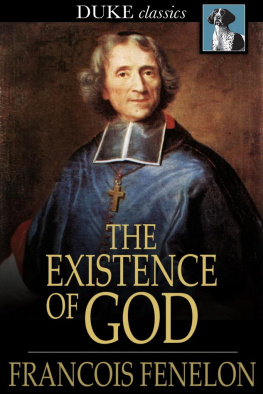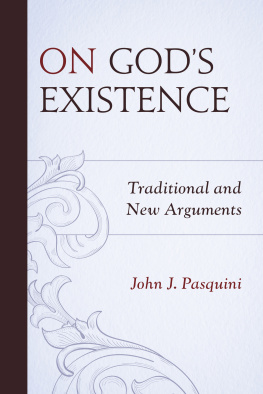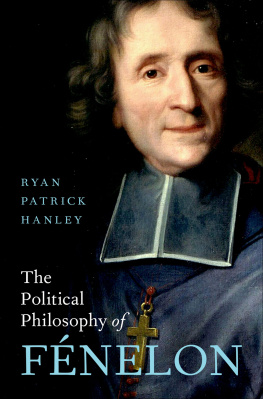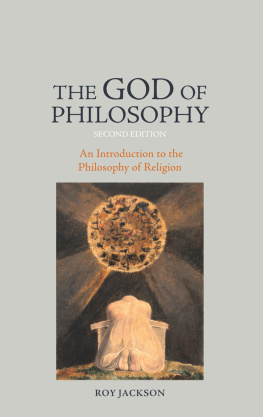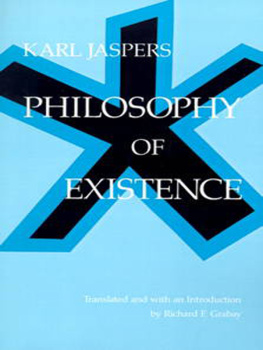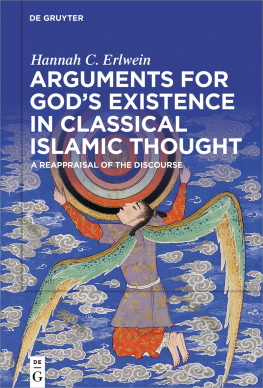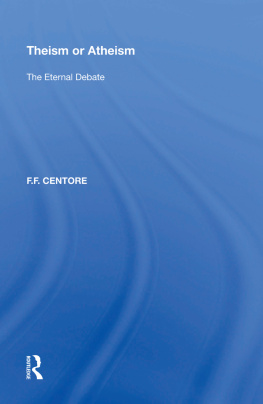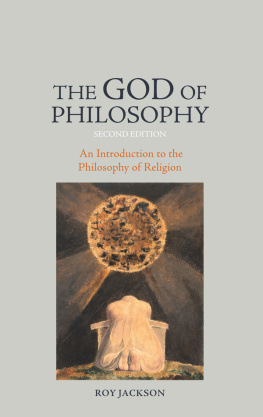Francois Fenelon - The Existence of God
Here you can read online Francois Fenelon - The Existence of God full text of the book (entire story) in english for free. Download pdf and epub, get meaning, cover and reviews about this ebook. publisher: Duke Classics, genre: Science. Description of the work, (preface) as well as reviews are available. Best literature library LitArk.com created for fans of good reading and offers a wide selection of genres:
Romance novel
Science fiction
Adventure
Detective
Science
History
Home and family
Prose
Art
Politics
Computer
Non-fiction
Religion
Business
Children
Humor
Choose a favorite category and find really read worthwhile books. Enjoy immersion in the world of imagination, feel the emotions of the characters or learn something new for yourself, make an fascinating discovery.
- Book:The Existence of God
- Author:
- Publisher:Duke Classics
- Genre:
- Rating:5 / 5
- Favourites:Add to favourites
- Your mark:
- 100
- 1
- 2
- 3
- 4
- 5
The Existence of God: summary, description and annotation
We offer to read an annotation, description, summary or preface (depends on what the author of the book "The Existence of God" wrote himself). If you haven't found the necessary information about the book — write in the comments, we will try to find it.
The debate over the existence of God is one of the questions that has animated Western philosophy for thousands of years. In this engaging volume, Catholic theologian Francois Fenelon provides an overview of some of the most compelling arguments for and against the existence of God. A must-read for believers and skeptics alike.
The Existence of God — read online for free the complete book (whole text) full work
Below is the text of the book, divided by pages. System saving the place of the last page read, allows you to conveniently read the book "The Existence of God" online for free, without having to search again every time where you left off. Put a bookmark, and you can go to the page where you finished reading at any time.
Font size:
Interval:
Bookmark:

First published in 1688
ISBN 978-1-62011-019-5
Duke Classics
2012 Duke Classics and its licensors. All rights reserved.
While every effort has been used to ensure the accuracy and reliability of the information contained in this edition, Duke Classics does not assume liability or responsibility for any errors or omissions in this book. Duke Classics does not accept responsibility for loss suffered as a result of reliance upon the accuracy or currency of information contained in this book.
An ancestor of the French divine who under the name of Fenelon hasmade for himself a household name in England as in France, wasBertrand de Salignac, Marquis de la Mothe Fenelon, who in 1572, asambassador for France, was charged to soften as much as he could theresentment of our Queen Elizabeth when news came of the massacre ofSt. Bartholomew. Our Fenelon, claimed in brotherhood by Christiansof every denomination, was born nearly eighty years after that time,at the chateau of Fenelon in Perigord, on the 6th of August, 1651.To the world he is Fenelon; he was Francois de Salignac de la MotheFenelon to the France of his own time.
Fenelon was taught at home until the age of twelve, then sent to theUniversity of Cahors, where he began studies that were continued atParis in the College du Plessis. There he fastened upon theology,and there he preached, at the age of fifteen, his first sermon. Heentered next into the seminary of Saint Sulpice, where he took holyorders in the year 1675, at the age of twenty-four. As a priest,while true to his own Church, he fastened on Faith, Hope, andCharity as the abiding forces of religion, and for him also thegreatest of these was Charity.
During the next three years of his life Fenelon was among the youngpriests who preached and catechised in the church of St. Sulpice andlaboured in the parish. He wrote for St. Sulpice Litanies of theInfant Jesus, and had thought of going out as missionary to theLevant. The Archbishop of Paris, however, placed him at the head ofa community of "New Catholics," whose function was to confirm newconverts in their faith, and help to bring into the fold those whoappeared willing to enter. Fenelon took part also in some of theConferences on Scripture that were held at Saint Germain andVersailles between 1672 and 1685. In 1681 an uncle, who was Bishopof Sarlat, resigned in Fenelon's favour the Deanery of Carenas,which produced an annual income of three or four thousand livres.It was while he held this office that Fenelon published a book onthe "Education of Girls," at the request of the Duchess ofBeauvilliers, who asked for guidance in the education of herchildren.
Fenelon sought the friendship of Bossuet, who revised for him hisnext book, a "Refutation of the System of Malebranche concerningNature and Grace." His next book, written just before theRevocation of the Edict of Nantes in 1685, opposed the lawfulness ofthe ministrations of the Protestant clergy; and after the Edict,Fenelon was, on the recommendation of Bossuet, placed at the head ofthe Catholic mission to Poitou. He brought to his work ofconversion or re-conversion Charity, and a spirit of concession thatbrought on him the attacks of men unlike in temper.
When Louis XIV. placed his grandson, the young Duke of Burgundy,under the care of the Duke of Beauvilliers, the Duke of Beauvillierschose Fenelon for teacher of the pupil who was heir presumptive tothe throne. Fenelon's "Fables" were written as part of hiseducational work. He wrote also for the young Duke of Burgundy his"Telemaque"used only in MS.and his "Dialogues of the Dead."While thus living in high favour at Court, Fenelon sought nothingfor himself or his friends, although at times he was even in want ofmoney. In 1693as preceptor of a royal prince rather than asauthorFenelon was received into the French Academy. In 1694Fenelon was made Abbot of Saint-Valery, and at the end of that yearhe wrote an anonymous letter to Louis XIV. upon wrongful wars andother faults committed in his reign. A copy of it has been found inFenelon's handwriting. The king may not have read it, or may nothave identified the author, who was not stayed by it from promotionin February of the next year (1695) to the Archbishopric of Cambray.He objected that the holding of this office was inconsistent withhis duties as preceptor of the King's grandchildren. Louis repliedthat he could live at Court only for three months in the year, andduring the other nine direct the studies of his pupils from Cambray.
Bossuet took part in the consecration of his friend Fenelon asArchbishop of Cambray; but after a time division of opinion arose.Jeanne Marie Bouvier de la Mothe Guyon became in 1676 a widow at theage of twenty-eight, with three children, for whose maintenance shegave up part of her fortune, and she then devoted herself to thepractice and the preaching of a spiritual separation of the soulfrom earthly cares, and rest in God. She said with Galahad, "If Ilose myself, I save myself." Her enthusiasm for a pure ideal,joined to her eloquence, affected many minds. It provokedopposition in the Church and in the Court, which was for the mostpart gross and self-seeking. Madame Guyon was attacked, evenimprisoned. Fenelon felt the charm of her spiritual aspiration,and, without accepting its form, was her defender. Bossuet attackedher views. Fenelon published "Maxims of the Saints on the InteriorLife." Bossuet wrote on "The States of Prayer." These were therival books in a controversy about what was called "Quietism."Bossuet afterwards wrote a "Relation sur le Quietisme," of whichFenelon's copy, charged with his own marginal comments, is in theBritish Museum. In March, 1699, the Pope finally decided againstFenelon, and condemned his "Maxims of the Saints." Fenelon readfrom his pulpit the brief of condemnation, accepted the decision ofthe Pope, and presented to his church a piece of gold plate, onwhich the Angel of Truth was represented trampling many errors underfoot, and among them his own "Maxims of the Saints." At Court,Fenelon was out of favour. "Telemaque," written for the young Dukeof Burgundy, had not been published; but a copy having been obtainedthrough a servant, it was printed, and its ideal of a true king anda true Court was so unlike his Majesty Louis XIV. and the Court ofFrance, and the image of what ought not to be was so like what was,that it was resented as a libel. "Telemaque" was publiclycondemned; Fenelon was banished from Court, and restrained withinthe limits of his diocese. Though separated from his pupil, theyoung Duke of Burgundy (who died in 1712), Fenelon retained hispupil's warm affection. The last years of his own life Fenelon gaveto his work in Cambray, until his death on the 7th of January, 1715.He wrote many works, of which this is one, and they have beencollected into twenty volumes. The translation here given wasanonymous, and was first published in the year 1713.
H. M.
I cannot open my eyes without admiring the art that shinesthroughout all nature; the least cast suffices to make me perceivethe Hand that makes everything.
Men accustomed to meditate upon metaphysical truths, and to trace upthings to their first principles, may know the Deity by its idea;and I own that is a sure way to arrive at the source of all truth.But the more direct and short that way is, the more difficult andunpassable it is for the generality of mankind who depend on theirsenses and imagination.
Font size:
Interval:
Bookmark:
Similar books «The Existence of God»
Look at similar books to The Existence of God. We have selected literature similar in name and meaning in the hope of providing readers with more options to find new, interesting, not yet read works.
Discussion, reviews of the book The Existence of God and just readers' own opinions. Leave your comments, write what you think about the work, its meaning or the main characters. Specify what exactly you liked and what you didn't like, and why you think so.

